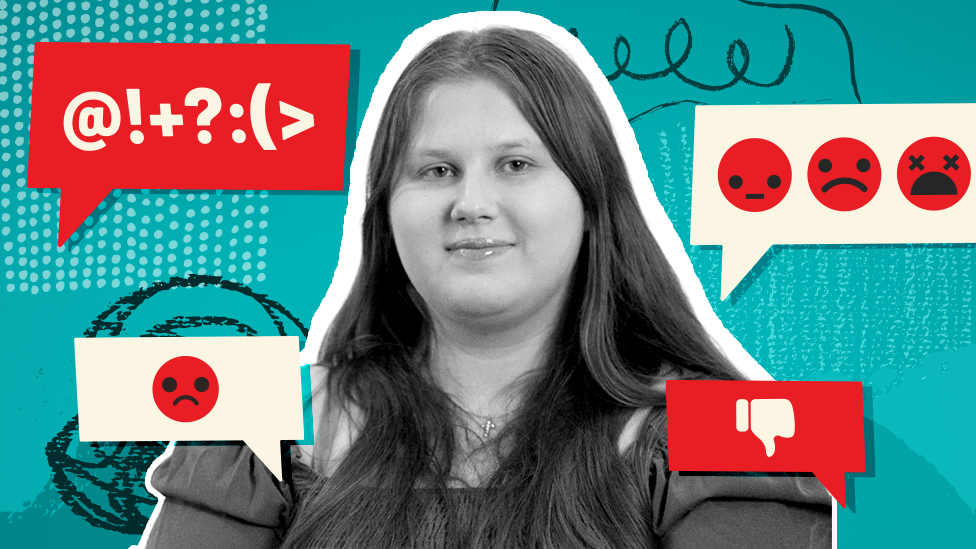Inside the Premier League unit hunting online trolls who threaten players
- Published
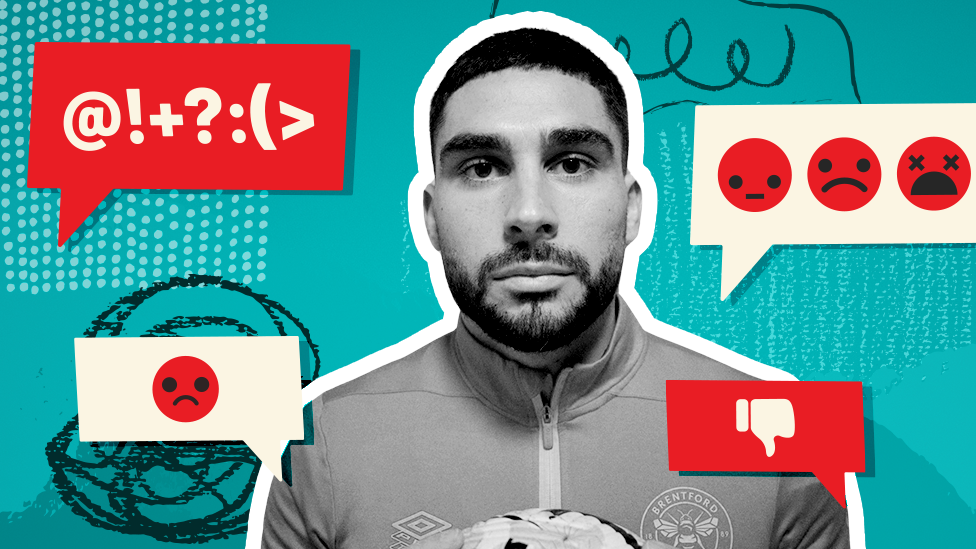
The Premier League is fighting a rise in social media threats against both its players and their families, with a team dedicated to hunting down online trolls. For a new series exploring extraordinary cases of online hate, the BBC gains exclusive access to the team, speaks to a top player targeted with abuse - and tracks down the man they helped convict for threatening him.
It's June 2020. Striker Neal Maupay has just scored the last-minute winner for his team Brighton in a tense match against Arsenal.
The 27-year-old Frenchman heads back into the dressing room. He checks his phone and is greeted with congratulations from friends and family after his goal. He posts online apologising for unintentionally injuring Arsenal's goalkeeper, Bernd Leno, during the game. But that does nothing to quell a tidal wave of abusive messages directed at him.
Maupay has been speaking to me for the BBC Radio 4 podcast, Why Do You Hate Me?
"I got home and got a phone call from the club saying, listen, there's a lot of stuff going on online. We advise you to switch off your social media and deactivate your accounts if you want to."
We are chatting in the dressing room of his current club, Brentford. He says that among the comments and messages was one anonymous account warning that his "loved ones would go through suffering". It threatened to harm him, and added: "Your family will be attacked later in the day just watch."
"It was very disturbing," he says. "I called the club and I said, we need to do something, because what if that guy is really coming to my house?"
Even once the account had been blocked by Instagram, another profile was set up by the same person. This time the message said: "You think by reporting my account you're safe? I will kill you and your family."
Maupay was one of the first players to refer abuse to the Premier League's troll-busting team.
In the past, fans could only hurl abuse from the terraces. Nowadays trolls can - and do - throw hate at players on social media, from all around the world and whenever they want.
That includes racist abuse, misogyny, transphobia, homophobia. In particular, threats targeting players and their families seem to be on the rise.
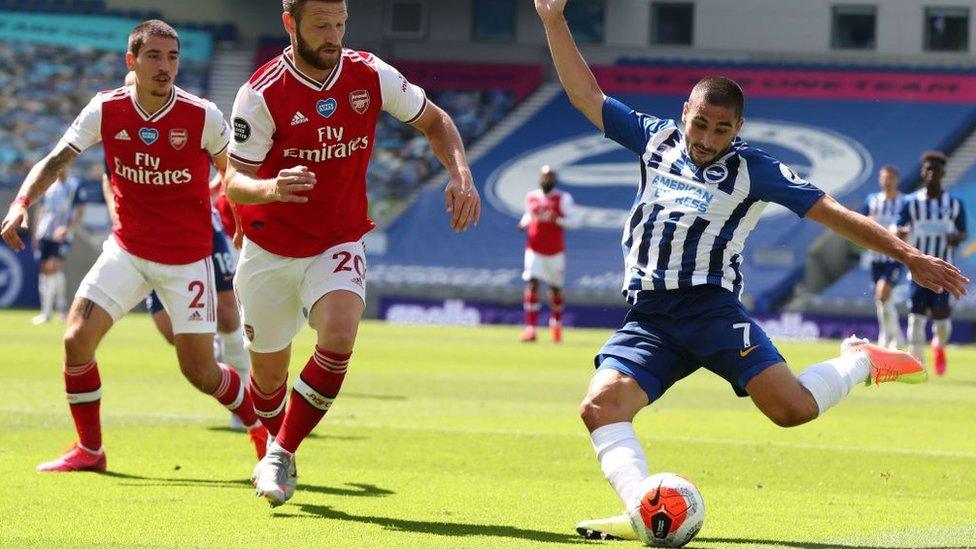
Neal Maupay was threatened after unintentionally injuring Arsenal's goalkeeper while playing for Brighton in 2020
Maupay tells me the abuse is "100% worse" now than it was even a few years ago. Although he's known for his wind-up tactics on the pitch, he says: "You can't be threatening football players like this just because your team lost."
When it comes to abuse on social media, the feeling of responsibility can often fall on the player. Maupay felt like he needed to read every hate message sent to him, and that he was "almost a part of the problem" if he did not try to tackle the abuse head on.
"I want to make sure I'm safe. And it's a bit of a shame, right? I'm playing football. I'm just minding my own business. And sometimes you have to do this. So it's sad, but that's the world we live in," he says.
Tim Cooper, who leads the Premier League troll-busting unit, says he remembers "instantly jumping" into action with his team when he got notifications of the messages sent to Maupay.
"We don't often see repeat infringers - the same person sending the same messages. We often see it as one outburst, rather than a real spiral of abuse aimed at one particular individual. So it's quite a unique case with Maupay where it was one user and then a follow-up."
Right from its start in 2019, Cooper's team - now made up of seven people - was receiving between 50 to 100 reports about players every week. They now also offer support to women footballers.
The Premier League had already developed techniques to identify people who were illegally sharing match clips on social media. Now these methods were employed to unmask trolls.
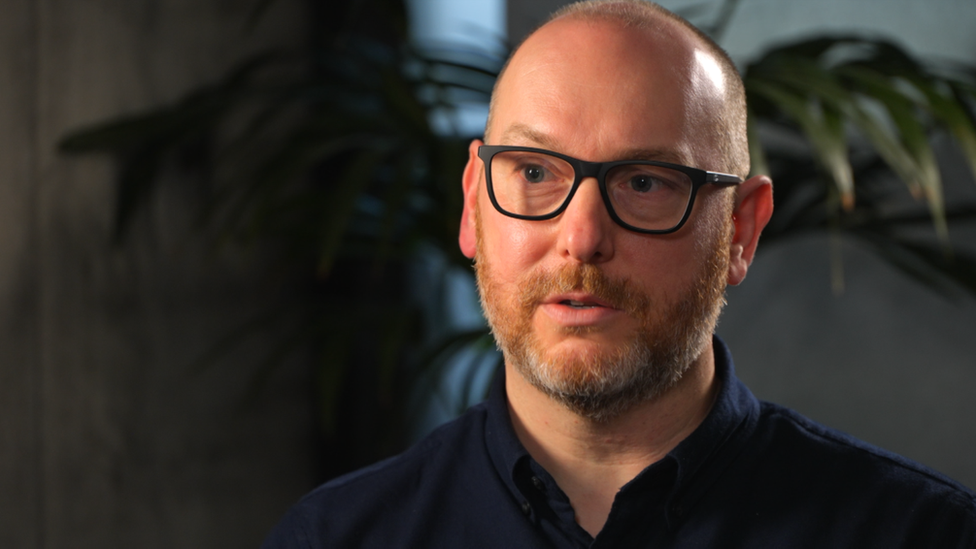
Tim Cooper, who heads the Premier League unit, says families of players are increasingly being abused online
As well as responding to reports from players, officials and others involved in the sport, the team will proactively look for abusive comments during matches. In particular, they are on alert for "trigger incidents" during the game, like a foul, a red card or a goal.
They have a list of abusive terms, comments and phrases to watch out for. They work to either have the post removed or to find out who sent the message. They can also alert the authorities if they think the law has been broken.
"I don't know if 'troll' is a bit too polite a word for some of the people that send the abuse," Cooper says.
The Premier League has no power to block or remove content that breaches the social media companies' guidelines, so the team relies on good co-operation with the platforms. The team says it feeds information it discovers about trolls' tactics into the social media companies too, which it suggests improves the sites for all users - not just footballers.
The unit is also sent direct messages, such as the ones received by Maupay, which staff would not otherwise be able to see.
Many are not just directed at the players themselves either, but their friends and family members.
"Sadly, sometimes more abuse is sent to them than the players themselves," Cooper explains. He says footballers' relatives and friends can be easier for trolls to target because their social media profiles are public.
When it came to Maupay's case, the team quickly realised the messages had likely reached the criminal threshold.
They used publicly available information to piece together who was behind the account, including looking at usernames, avatars and linked accounts. The poster was not from the UK, as Maupay had feared. Instead, the trail led them to a 19-year-old based in Singapore, Derek Ng De Ren.

One of the BBC's most trolled journalists, Marianna Spring, dives into her inbox and investigates extraordinary cases of online hate. She meets the people at the heart of these conflicts, and in some cases brings them together, to see if understanding - even forgiveness - is ever possible.
Listen now on BBC Sounds, watch on BBC iPlayer and read the previous instalments of the online series here and here.

Ng is an Arsenal fan who had been watching the game at his grandmother's home - and he blamed his team's loss on Maupay injuring Arsenal's goalkeeper.
Just over a year after sending the messages, the teenager was convicted of harassment in Singapore and sentenced to nine months' probation. He was also ordered to do community service and undergo psychological or psychiatric treatment.
The Premier League says it was the first time it was able to successfully work with authorities overseas on a case of abuse. But it is far from a unique incident - 80% of the abusive messages sent to Premier League players come from outside the UK.
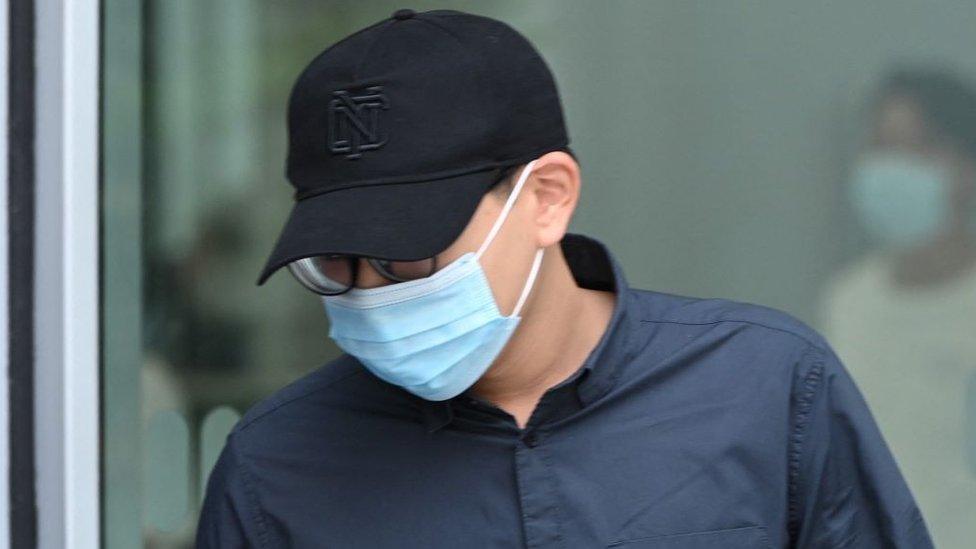
Ng - pictured outside court in 2021 - says he regrets sending abuse and threats to Neal Maupay
"We wanted to get a message out there that doesn't matter where you are in the world, we will hopefully - if you send abuse - be able to find you and be able to take action," Cooper tells me.
The team has also examined fans' social media accounts over allegations of discriminatory comments, even when they are not targeted at players or other individuals.
It has led to criticism that the Premier League is practising censorship and intruding into fans' lives. But Cooper says that in general they are dealing with "really nasty abuse", some of which could be considered criminal.
"We are not removing people's general thoughts or comments on a particular player, on a match or on the league itself," he says. "We're dealing with stuff that's really horrible and shouldn't have any place online."
Maupay found some comfort in the fact that Ng had to face the consequences of his behaviour online.
"If they [saw] me or someone else walking down the street, they wouldn't stop me. I think the guy just found out that you can't do whatever you want online," he says.
After the trial, Ng did write an apology letter. But at that time, the footballer did not read it.
"I think it's hard to forgive someone when you don't know the person, right? I never get it. If I go to the cinema, I don't like the film, I'm not going to go online and write messages, right? So if you don't like me or the way I play, just watch another striker."
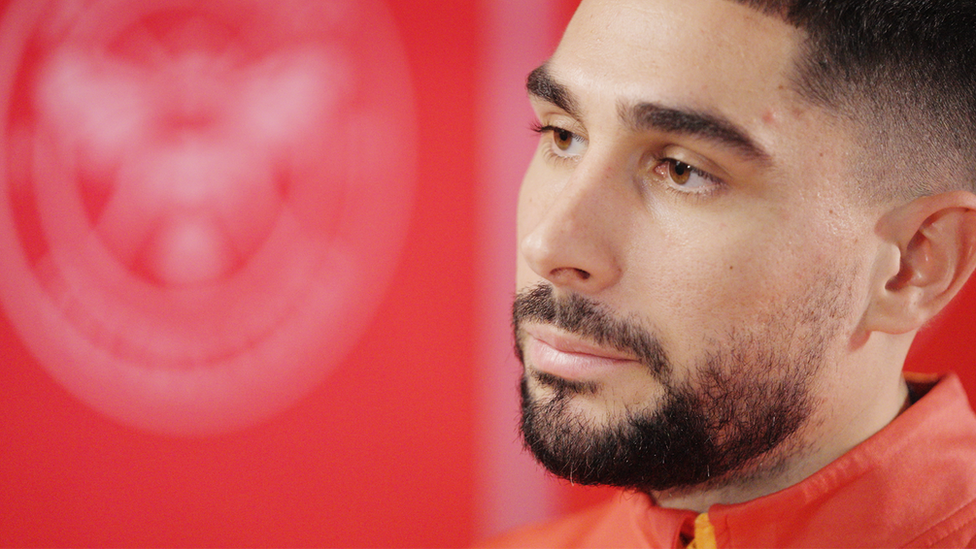
Maupay says fans who send abuse are learning that "you can't do whatever you want online"
However, Maupay says he is now open to hearing Ng's thoughts "to try to see where that person comes from".
There was no trace of his social media accounts online, but I managed to get in touch with Ng's lawyer. Through him, I finally got some answers.
Ng told his lawyer he had meant it when he said he was sorry in his first letter after the conviction.
"I was young, and that was an important explanation for why I behaved how I did. It was an outlet - social media. It didn't feel like it mattered at the time. I've moved on and I'm doing OK," Ng said.
"I accept what I did was wrong and now want to forget this and move on. I have tried to start afresh. I didn't expect this to unfold in the way it did and just wanted it to be resolved. I really regret that it amounted to all this and happened like this."
Maupay read this note, and now he says: "I'm ready to move on."
I have trawled through the footballer's Instagram comments and seen the hate he continues to receive from other people. I have messaged several more of his trolls, and a few told me this was an outlet for their anger about the game.
Does accountability for one troll make a difference?
The problem is complex, and the solution seems to lie in a whole lot of people taking responsibility for harmful behaviour online - whether that is the trolls themselves, the social media companies, the authorities or society more broadly.
Related topics
- Published7 July 2021
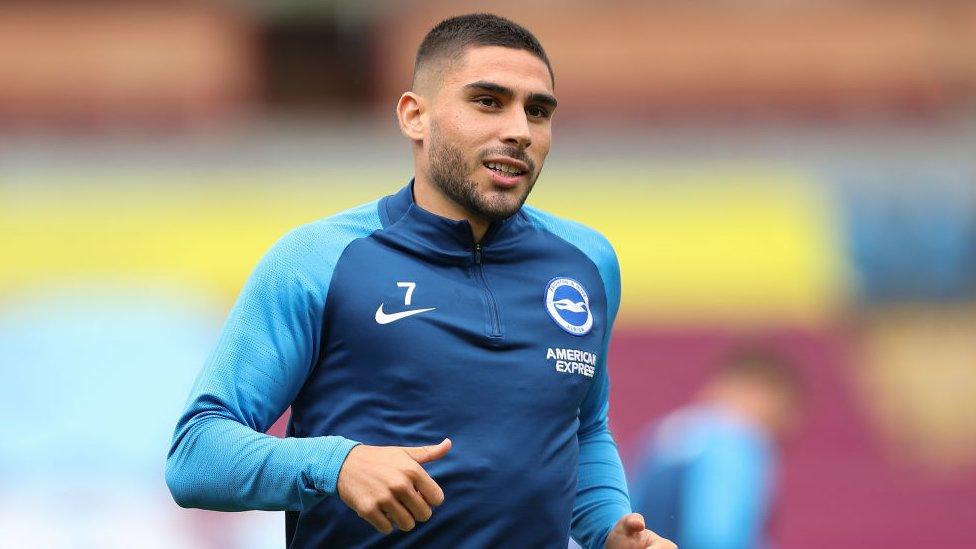
- Attribution
- Published14 May 2021
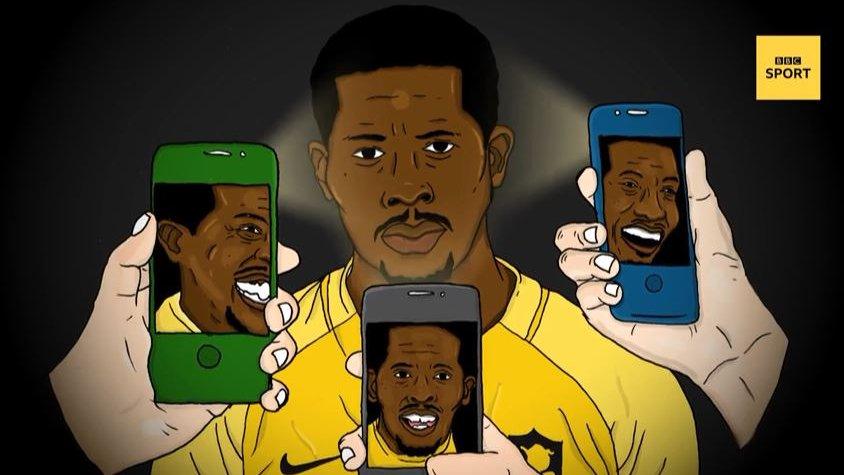
- Published13 February 2024
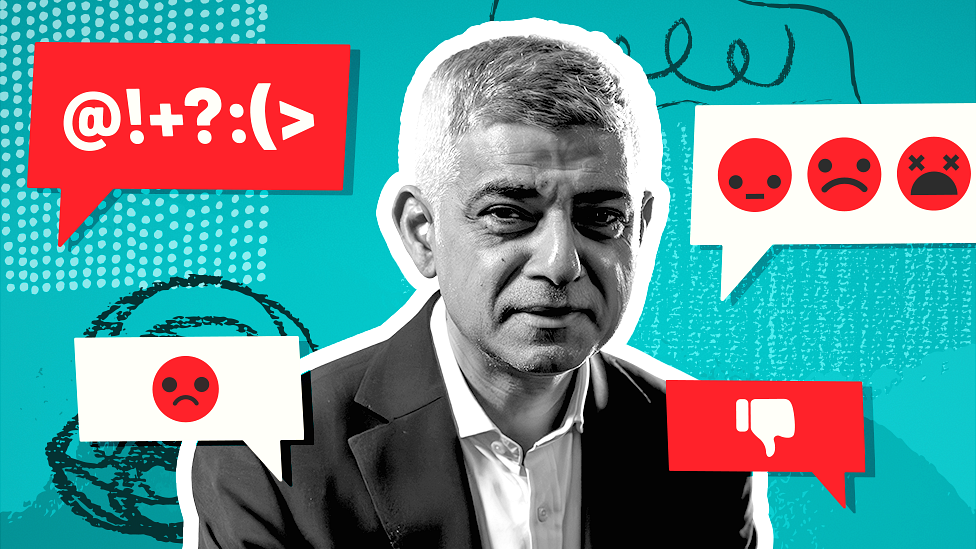
- Published30 January 2024
